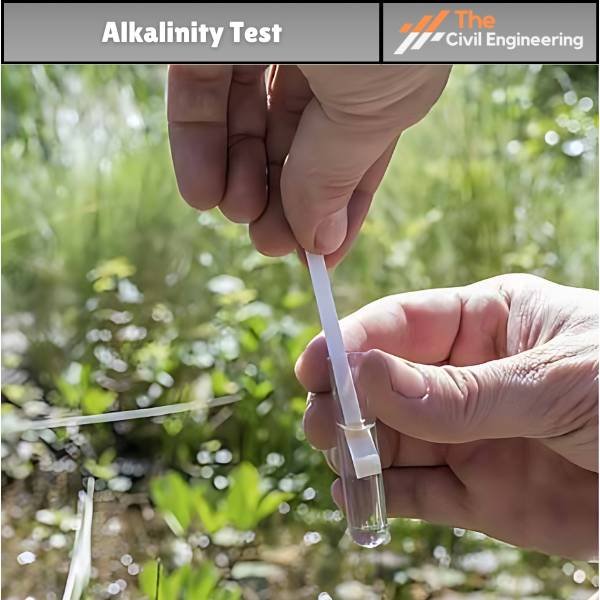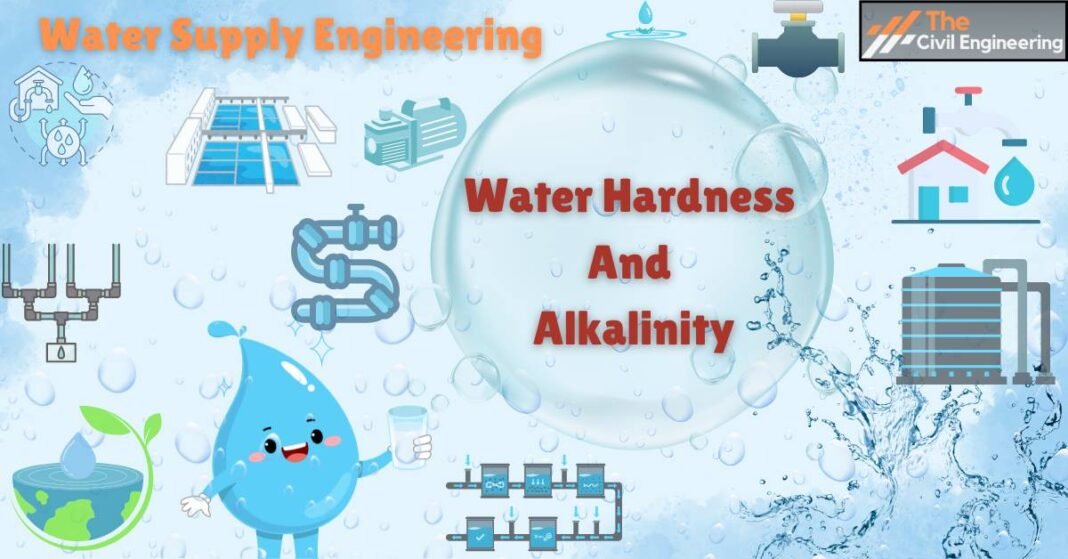In this article, we will discuss Hardness and Alkalinity Numerical.
1. Formula
| Alkalinity due to B– as CaCo3 = alkalinity as B– x eq. wt. of CaCo3 / eq. wt. of B– |
| Hardness due to M++ as CaCo3 = hardness as M++ (mg/lit) x eq. wt. of CaCo3 / eq. wt. of M++ |
| Total Hardness = Carbonate hardness + Non carbonate hardness |
| [H+] = antilog10 [-pH] , |
If, TH > A
then, CH = A
NCH = TH-CH
NCH = TH-A
If, TH =<A
then, CH= TH
NCH=0

2. Hardness and Alkalinity Numerical
1. The analysis of water from a well showed the following results in mg/lit;
Ca= 65, Mg=51, Na=101.5, K= 21.5,
HCO3 = 248, SO4 = 221.8, Cl = 79.2
Find the total hardness, carbonate hardness and non-carbonate hardness.
Solution:
Hardness due to M++ as CaCo3 = hardness as M++ (mg/lit) x eq. wt. of CaCo3 / eq. wt. of M++
Total hardness = [ 65x 50/20 +51 x 50/12.2] mg/lit as CaCo3.
= 371.52 mg/lit as CaCo3
Alkalinity due to B– as CaCo3 = alkalinity as B– x eq. wt. of CaCo3 / eq. wt. of B–
= 248 x 50/61
= 203.28 mg/lit
In this case.
If, TH > A
then, CH = A
NCH = TH-CH
= 371.52-203.28
= 168 mg/lit
The analysis of a sample of water shows the following results in mg/lit:
| Ca | Mg | Na | K | No3 | Cl | HCo3 |
| 7 | 12 | 20 | 30 | 12 | 40 | 68 |
The concentration of Sr (Stroncium) is eq. to the hardness of 2.52 mg/lit as CaCo3 and the carbonate alkalinity in this water is zero. Calculate the total hardness and NCH in mg/lit as CaCo3.
Solution,
Total hardness = Ca++ x 50./20 +Mg++ x 50/12.2 +2.52
= 7×50/20 + 12×50/12.2 +2.52
= 69.2 mg/lit as CaCo3.
Bicarbonate alkalinity= 68 x 50/61 =55.74 mg/lit as CaCo3
In this case,
TH>A
CH= A
NCH = TH-CH
=69.2-55.74
= 13.46 mg/lit as CaCo3
3. The total hardness value obtained from the complete analysis of a water sample is found to be 150 mg/lit. The analysis further showed that the concentrations of all the three principal cations causing hardness are numerically the same. If the value of carbonate hardness is 77 mg /lit, calculate;
1) the value of NCH
2) the concentrations of principal cations; and
3) the value of total alkalinity in mg/lit.
Solution:
Total Hardness = Carbonate hardness + Non Carbonate Hardness
NCH = 150 – 77 = 73 mg/lit
Let, P is the concentration of principle cations.
Now, TH= P x 50/20 + P x 50/12.2 + P x 50/43.8
Principle concentrations (P)= 19.38 mg/lit
In this case, NCH is greater than zero so total hardness is greater than
alkalinity.
When, TH > A
then, CH = A = 77 mg/lit as CaCo3
NCH = TH-CH
| Read Also: Quantity of Water Numerical |
4. The hardness of a water sample was found to be 300 mg/lit as CaCo3. The hardness was found due to Ca and Mg ions being equal in Water. The analysis showed the concentration of HCO3, was 150 mg/lit,
ii) the concentration of Ca and Mg
ii) the value of alkalinity of water.
iii) the CH and NCH; and
Solution:
i. Let, P is the concentration of principal cations.
Hardness due to M++ as CaCo3 = hardness as M++ (mg/lit) x eq. wt. of CaCo3 / eq. wt. of M++
Total Hardness = [50P/20 + 50P/12.2] mg/lit as CaCo3
300 = 6.6 P
Therefore, P = 45.45 mg/lit
ii) Bicarbonate alkalinity
Bicarbonate alkalinity = 150 x 50/61 = 122.95 mg/lit as CaCO3
Total alkalinity = CA + BA = 0 + 122.95 = 122.95 mg/lit
iii) Here, Total hardness > Total alkalinity
Carbonate hardness = Total alkalinity = 122.95 mg/lit
Total Hardness = Carbonate hardness + Non Carbonate Hardness NCH
= 300-122.95
= 177.05 mg/lit as CaCO
| Read Also: How To Calculate Area of Land Or Plots Area That Are Irregular In Shape |
5. If 400 ml of water with a pH 6 is mixed with 700 ml of water with a pH of 8, what will be the resultant pH of the mixture?
Given,
Va = 400 ml, (PH)a = 6
Vh = 700 ml, (pH)b = 8
Total volume of solution = 1100 ml
[H+] = antilog10 [-pH] ,
pH = log10 1/[H+]
[Hla = 10-6 moles/lit,
Conc. of [H+]a in 400 ml = 10-6 x 400 / 1100 = 3.64×10-7 moles/lit
Conc. of [H+lb in 700 ml = 10-8 x 700/1100 = 6.36×10-9 moles/lit
Concentration mix
= 3.64 x 10-7 + 6.36 x 10-9
= 3.7036 x 10-7 moles/lit
pH= 6.43

